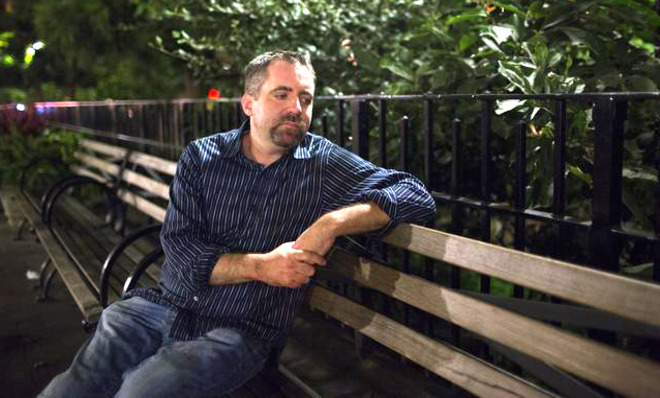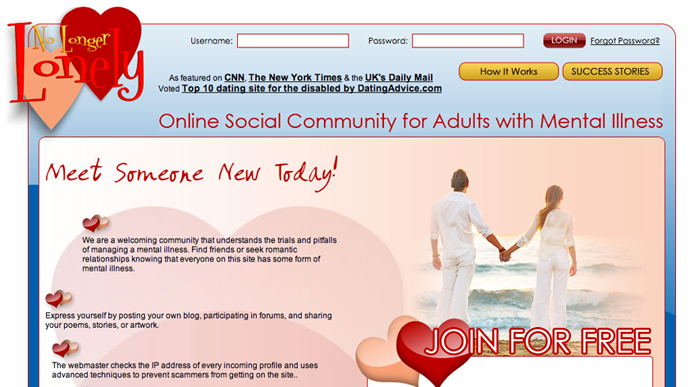The matchmaker for the mentally ill
Getting intimate with the man behind the first dating website for singles with psychiatric disorders

A free daily email with the biggest news stories of the day – and the best features from TheWeek.com
You are now subscribed
Your newsletter sign-up was successful

It's been 10 years since James Leftwich first created No Longer Lonely, a dating website exclusively for people with mental illnesses. Leftwich spoke with me about the challenges of running the site and about why he believes forming loving relationships should be recommended more frequently than pills.
Why did you create No Longer Lonely?
It was one of those things where I looked for something and it didn't exist. I thought, this is a really logical thing. This should exist. People with mental illness tend to band together. It's kind of an unsympathetic world.
The Week
Escape your echo chamber. Get the facts behind the news, plus analysis from multiple perspectives.

Sign up for The Week's Free Newsletters
From our morning news briefing to a weekly Good News Newsletter, get the best of The Week delivered directly to your inbox.
From our morning news briefing to a weekly Good News Newsletter, get the best of The Week delivered directly to your inbox.
How did No Longer Lonely start?
Around 2004 it was underway but it wasn't as big as it is now. A dating site is something that has a critical mass where it's not very effective until you get a certain amount of people. I'm still facing that challenge but it's a big world.
No Longer Lonely has chat rooms, forums, and places for people to post their art. Why did you design it like that?
I did model it after the major dating sites, but I added certain categories too, like housing options for Section 8 or 'I live with my parents' or 'I live in a halfway house.' I thought it was important to have a category for 'Do you own your own transportation?' because that can be a big deal among people that are mentally ill. Most of them don't have their own car or anything like that so that makes a difference. The artwork—that's an area that didn't take off as much as I thought it would. There are a lot of talented people with mental illness that have great creative potential and I thought that would be an important way to let people connect and share on that level.
A free daily email with the biggest news stories of the day – and the best features from TheWeek.com
(More from Narratively: The BMX boys of E.T.)
How many users does No Longer Lonely have?
I have over 30,000 users. A sizeable percentage of those probably haven't been on the site for a while. I do occasional purges to get rid of older profiles. But who knows? That person might get a message and come back. The big stat is the amount of marriages that I've had with the site. And these are only the ones that I've been told of, but there's been more than 30.

You must have a mental illness to be on the site. How does that work?
It's difficult. I can't biopsy everybody's brain. But it's actually been pretty good. I've had very few people that come on there as a joke or prey on the users, at least that I know of. I worry about that a lot. It's a very vulnerable population. I'm very diligent about who's on the site. I actually got press on a site called cracked.com. It's a jokey kind of site. They featured me as one of the most ill-advised dating sites on the web. All these jokes about, you know, 'What does psycho 1 plus psycho 2 equal?'
Was it painful?
It wasn't painful, it was just immature. But the ironic thing is that it gave me a lot of traffic. Every once in awhile you get someone whose user profile is "Batshit crazy" or something, or says, "I like to put heads in my freezer," joke stuff like that. But that doesn't happen often.
What are some of the mental illnesses that your users have?
I didn't create the categories, it's just what the major ones are: schizophrenia, schizoaffective, but I may have to remove that as an option. Bipolar, depression, anxiety. Another one that's gone is Asperger's. Asperger's doesn't exist anymore, now it's an autism spectrum disorder. There really aren't that many categories of mental illness. But I don't think people identify themselves that much as, 'I am that or this.' I am somebody who struggles with [a psychiatric] diagnosis and I take medicine for it.
Do you mind saying what you've been diagnosed with?
I was diagnosed with what's called schizoaffective disorder which, because of DSM-V, doesn't exist anymore. But it falls under a schizophrenia spectrum disorder. Schizoaffective: you're blessed with both a psychotic disorder and a depressive disorder so it's one of the more chronic diagnoses.
(More from Narratively: Kidnapped in Syria)
How did the DSM-V, (the American Psychiatric Association's newly-revised diagnostic manual) change it?
They just removed schizoaffective and now it falls under schizophrenia. There are spectrum disorders within schizophrenia. DSM-V's kind of a weird animal. It's kind of like where they elect the pope; they just put people in a room and they figure something out. I was first hospitalized in 1992. That's my only hospitalization, but I was there for about two months.
How old were you at this time?
Twenty-two. I'm forty-three now. That was the halfway point of my life. I hadn't dated much and was really afraid of disclosing to women. I was much more inhibited and shy than I am now.
What exactly were you afraid of?
I think a lot of it was just a negative self-image. Once you've been branded with this illness you feel kind of like a reject, in a way. People tell you 'Oh, don't have big dreams. Play it safe. Just take your meds. Talk to your doctor'… so a lot of dreams kind of went by the wayside. I kind of felt like I had graduated to this specific little world of people that had mental illness. I wasn't making any new friends that were not mentally ill at the time.
(More from Narratively: The guardian of the Chelsea Hotel's secrets)
So all of your friends had mental illnesses?
Pretty much, yeah. I didn't have many friends. It really is a tribe. This was kind of a transition period for me. I started working at a college library, which turned into a full-time position by 2004. I became the director of that library in 2007 and I'm still the director. I didn't have much of a love life to speak of for quite some time. A lot of it was a fear of rejection, but a lot of it was this negative self-image thing that people without mental illness wouldn't want to have anything to do with me.
Feeling worthy of love is something I really struggle with. I mean, I don't like who I am when I'm depressed. I don't like who I am when I get anxiety attacks, so why would I think that someone else would love that?
I'm the same way. When I turn inward, I don't want to pollute people with what's going on. I feel like I'm a bad person sometimes. There's this part of me that thinks that life is supposed to be enjoyed, it's this wonderful gift and everything, and yet I'm completely depressed so it's like I'm a bad person for feeling that way. But there are certain levels. There's stigma involved and everything, but once you put the word "schiz-" in front of something, there's a lack of education. People don't know. People don't understand what these things are.
Read the rest of the story at Narratively.
Narratively is an online magazine devoted to original, in-depth and untold stories. Each week, Narratively explores a different theme and publishes just one story a day. It was one of TIME's 50 Best Websites of 2013.